E-commerce Platforms Face-Off
Choosing between Shopify vs Etsy for your online store? This list compares top e-commerce platforms, including Shopify, Etsy, BigCommerce, WooCommerce, Amazon Handmade, Squarespace, Wix, and Shopify Lite, to help you find the perfect solution for your business in 2025. Launching a successful online store can be daunting, but selecting the right platform makes all the difference. We’ll break down pricing, features, ease of use, and scalability so you can confidently choose the best fit.
1. Shopify
Shopify is a leading e-commerce platform that empowers you to build and manage your own online store. Unlike marketplace platforms like Etsy, Shopify provides complete control over your brand and customer experience, allowing you to create a truly unique online presence. It's a comprehensive solution offering everything from website design and hosting to inventory management, payment processing, and marketing tools. This makes Shopify ideal for businesses of all sizes, from solo entrepreneurs just starting out to established brands looking for a scalable and customizable e-commerce solution. Whether you’re selling handmade crafts, digital products, or physical goods, Shopify provides the tools you need to succeed in the competitive world of online retail. Are you looking for complete control over your branding and a scalable solution to grow your business? Then Shopify deserves strong consideration when evaluating "Shopify vs Etsy."

With over 70 professional themes, you can easily customize the look and feel of your store to match your brand identity. Shopify’s intuitive drag-and-drop interface makes it easy to build and manage your website, even without any coding experience. A comprehensive inventory and order management system simplifies tracking products, processing orders, and managing customer information. Built-in payment processing through Shopify Payments streamlines transactions, although third-party payment gateways are also supported. Furthermore, robust analytics and reporting tools provide valuable insights into your store's performance, helping you make data-driven decisions to optimize sales and marketing strategies. Learn more about Shopify and how to optimize your conversion rates. Shopify's extensive app ecosystem, with over 6,000 integrations, further extends the platform's functionality, allowing you to connect with various marketing, shipping, and customer service tools.
Pricing and Technical Requirements: Shopify offers various pricing plans starting at $29/month, plus transaction fees if you don't use Shopify Payments. No specific technical expertise is required to set up and manage a Shopify store, thanks to its user-friendly interface. However, some HTML and CSS knowledge can be helpful for advanced customization.
Shopify vs Etsy: While Etsy offers a readily available marketplace with built-in traffic, Shopify offers greater control. With Shopify, you're not competing directly with similar sellers on the same platform, and you have more freedom in branding and marketing. This makes Shopify a better choice for businesses focused on building a long-term brand identity.
Implementation Tips: Start with a free trial to explore Shopify's features. Carefully choose a theme that aligns with your brand and target audience. Optimize your product listings with high-quality images and compelling descriptions. Leverage Shopify's marketing tools and app integrations to drive traffic to your store.
Pros:
- Complete control over branding and store design
- Scalable solution that grows with your business
- Powerful marketing tools and SEO capabilities
- 24/7 customer support
Cons:
- Monthly subscription fee and transaction fees (if applicable)
- Steeper learning curve compared to marketplaces like Etsy
- Requires more marketing effort to drive traffic
- Additional costs for premium themes and apps
Website: https://www.shopify.com/
2. Etsy
Etsy is a global online marketplace specifically designed for selling handmade, vintage, and unique factory-manufactured items. It's a platform that connects creative entrepreneurs directly with buyers searching for one-of-a-kind products. If you're an artisan, crafter, or small business owner selling distinctive goods, Etsy provides a built-in customer base of millions of shoppers actively looking for items like yours. When comparing Shopify vs Etsy, Etsy's strength lies in its ready-made market and simplified selling process. It's an ideal starting point for many small businesses looking to test the waters of online selling.
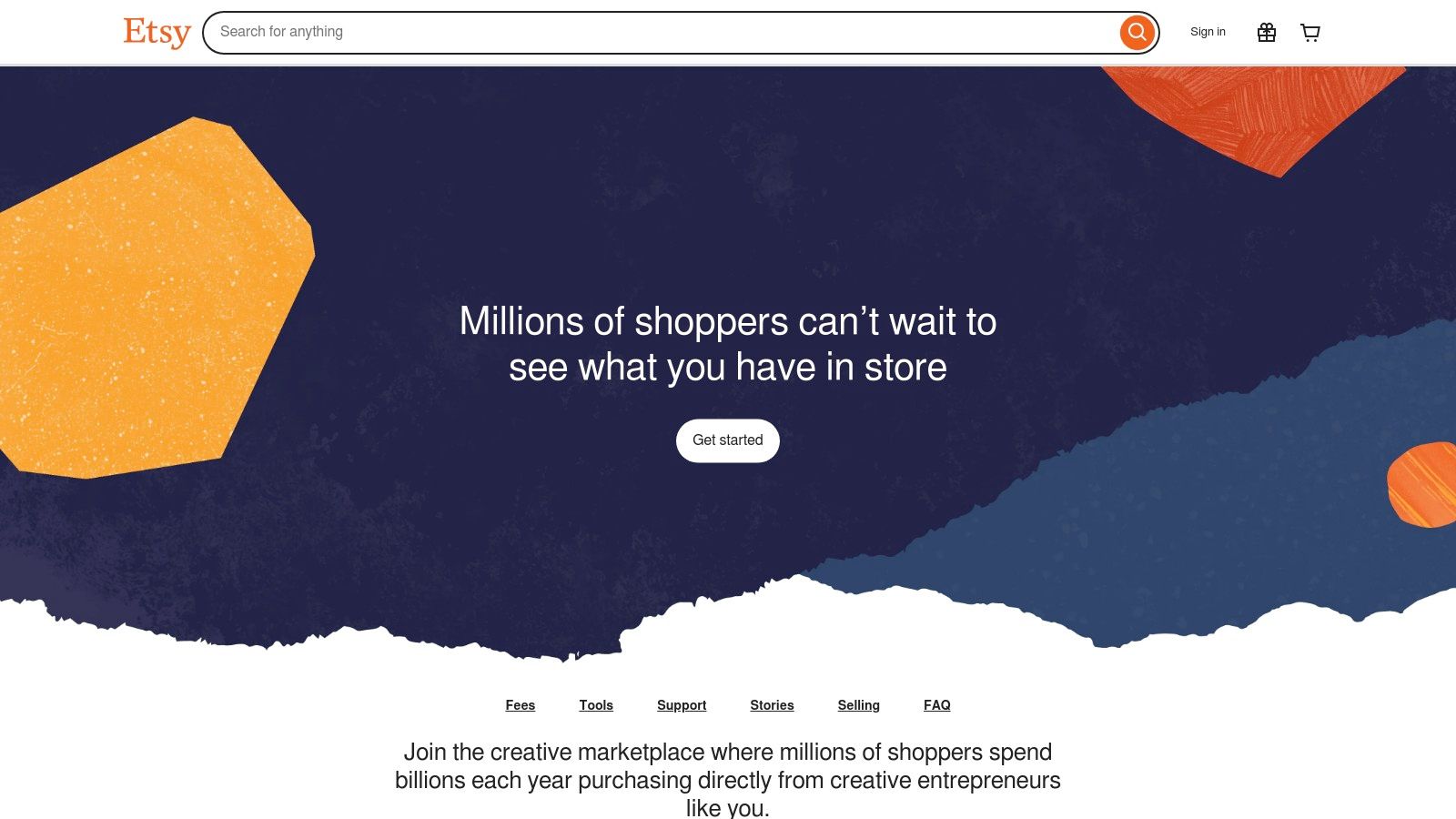
Etsy's focus on unique items makes it a strong contender in the Shopify vs Etsy debate, particularly for sellers just starting out. With a simple shop setup requiring minimal technical knowledge, you can quickly list your products and access Etsy's vast customer base. Features like built-in SEO and discovery tools help your products get found, while integrated payment processing and order management streamline the selling process. A mobile app enables you to manage your shop on the go, offering flexibility and control. You could Learn more about Etsy and their brand presence to optimize your shop's visibility.
One key advantage of Etsy compared to Shopify is the low startup cost. There are no monthly fees, making it an attractive option for new businesses. You pay a 5% transaction fee plus a 3% + $0.25 payment processing fee for each sale. This pay-as-you-go model can be beneficial when you're starting out, but as your sales volume increases, these fees can become significant. This is a critical point in the Shopify vs Etsy comparison, as Shopify's monthly fees, while higher upfront, can be more cost-effective in the long run for high-volume sellers.
Furthermore, Etsy provides a built-in trust factor. Shoppers associate Etsy with unique, handcrafted goods, giving your shop an inherent credibility boost. This established trust can be particularly valuable for new businesses trying to build a reputation. Setting up and managing an Etsy shop is significantly simpler than building a standalone store on Shopify. This ease of use allows you to focus on creating and selling your products rather than dealing with technical website management.
However, Etsy does have limitations. You have less control over your shop's branding and design compared to Shopify. Customization options are restricted, making it harder to create a truly unique brand experience. Competition can also be fierce, as you’re selling alongside other artisans offering similar products. Finally, Etsy has restrictive policies on what can be sold, limiting the types of products you can offer. You should carefully review these policies before choosing Etsy.
Etsy earns its spot on the Shopify vs Etsy list by offering a streamlined, accessible marketplace for creators. Its simplicity and built-in customer base are compelling reasons for many sellers, especially those just beginning their online journey. However, the trade-off for this convenience is less control, higher transaction fees, and competition. Weighing these pros and cons carefully against your specific needs and business goals will help you determine whether Etsy or Shopify is the right platform for you. Visit their website https://www.etsy.com/sell to get started.
3. BigCommerce
When comparing Shopify vs Etsy, BigCommerce emerges as a powerful contender, especially for businesses anticipating rapid growth or focusing on B2B sales. While Etsy caters to a handmade and vintage niche and Shopify serves a broader audience, BigCommerce targets businesses needing enterprise-level features without the enterprise-level price tag (at least initially). It offers a robust platform with a focus on scalability and built-in functionality, making it a compelling alternative for certain merchants.
BigCommerce distinguishes itself through its extensive built-in features, minimizing the need for third-party apps that often add complexity and cost to Shopify stores. This means functionalities like advanced SEO, multi-channel selling, and even B2B tools are readily available right out of the box. If you're scaling quickly or need robust features from the get-go, this can be a significant advantage. Learn more about BigCommerce to understand how its feature-rich environment can impact your sales strategy.
This platform provides a compelling solution for businesses seeking a scalable and feature-rich platform. Here’s a closer look at what BigCommerce offers:
Features:
- Enterprise-grade features with no transaction fees on any plan: Unlike Shopify, BigCommerce doesn't take a cut of your sales, regardless of your chosen plan. This can translate to significant savings as your sales volume increases.
- Unlimited products, file storage, and bandwidth: BigCommerce allows you to grow your product catalog without limitations, supporting high-volume sales and large product databases.
- Built-in B2B functionality and multi-channel selling tools: This is a key differentiator, particularly if you're selling to other businesses or across multiple platforms like Amazon and eBay.
- Advanced SEO tools and customization options: BigCommerce equips you with powerful SEO tools to improve your organic search visibility and flexible customization options to tailor your storefront to your brand.
- Headless commerce capabilities for custom frontend experiences: For those needing a highly customized storefront or unique integrations, BigCommerce's headless commerce capabilities offer exceptional flexibility.
Pros:
- More built-in features than Shopify, reducing reliance on apps: This translates to potential cost savings and a simplified store management experience.
- Excellent scalability for high-volume businesses: BigCommerce is built to handle substantial growth and high traffic.
- Strong SEO capabilities out of the box: Improve your search rankings without needing to rely heavily on external apps.
- Robust B2B selling features: Streamline your B2B sales process with integrated tools specifically designed for this market segment.
Cons:
- Higher starting price point at $29.95/month: While the basic plan offers considerable value, it's a higher entry point than Shopify's basic plan.
- Smaller app marketplace compared to Shopify: While fewer apps are needed, the choice is still more limited if you require specific integrations.
- Less intuitive interface for beginners: The extensive feature set can make the initial learning curve steeper for users new to e-commerce.
- Limited free themes available: Customization options are plentiful, but the selection of free themes is somewhat restricted.
Website: https://www.bigcommerce.com/
In the Shopify vs Etsy debate, BigCommerce presents a third option worth considering. If your priorities are scalability, robust built-in features, and a platform geared towards growth (especially in the B2B space), then BigCommerce might be the ideal solution for you. While Etsy is a specialized marketplace and Shopify offers a balance of features and affordability, BigCommerce caters to businesses with more demanding needs and ambitious growth plans.
4. WooCommerce
When comparing Shopify vs Etsy, WooCommerce emerges as a powerful alternative for businesses seeking maximum control and flexibility. Unlike Shopify's all-in-one platform and Etsy's marketplace environment, WooCommerce offers a unique self-hosted approach. It's a free, open-source WordPress plugin, meaning it seamlessly integrates with existing WordPress websites and leverages the platform's content management capabilities. This makes WooCommerce an especially compelling option for businesses already invested in the WordPress ecosystem or those prioritizing content marketing alongside their e-commerce efforts. This control also extends to the look, feel, and functionality of your store, letting you tailor it precisely to your brand and needs. It powers a significant portion of all online stores – approximately 29% – demonstrating its popularity and robustness.
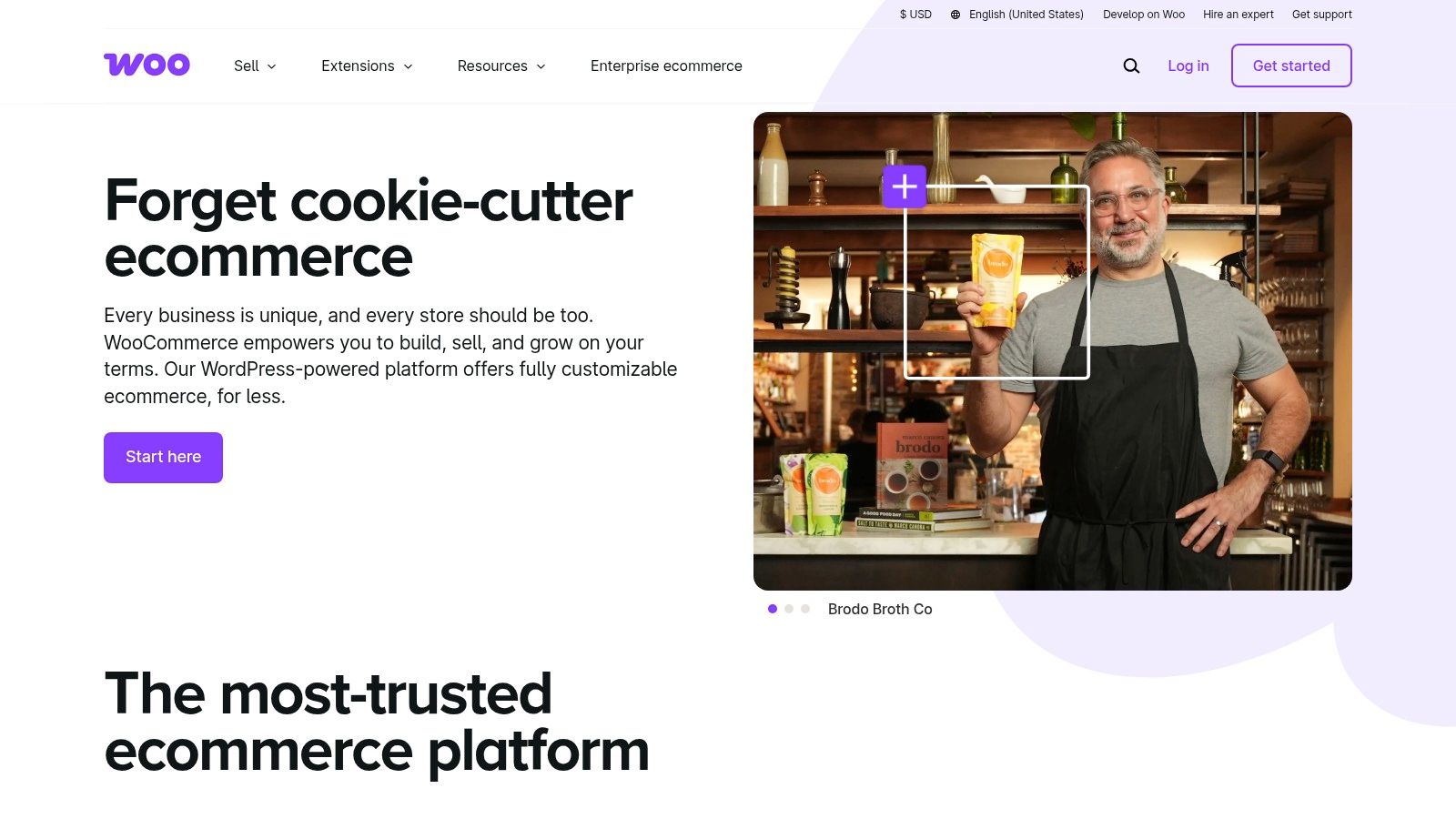
WooCommerce distinguishes itself in the Shopify vs Etsy debate by giving you complete ownership of your online store. While Shopify charges monthly platform fees, WooCommerce is free to use. You only pay for hosting, which gives you greater control over costs and scalability. This open-source nature also translates to unparalleled customization. You have full access to the code, allowing developers to create highly bespoke online stores. A vast library of free and premium extensions further extends WooCommerce's functionality, offering solutions for everything from payment gateways to shipping integrations. This positions WooCommerce as a more technically oriented platform, offering a different experience from the streamlined interfaces of Shopify and Etsy.
Features:
- Free, open-source plugin for WordPress websites
- Unlimited customization potential with full code access
- Extensive library of free and premium extensions
- Complete control over data and hosting environment
- Native integration with WordPress content management system
Pros:
- No mandatory monthly platform fees (hosting costs only)
- Unparalleled flexibility and customization options
- Huge community support and developer ecosystem
- Seamless integration with WordPress content marketing
Cons:
- Requires separate WordPress hosting and maintenance
- More technical setup and ongoing management required
- Security and updates must be managed manually
- Can become complex as your store grows
Implementation Tips:
- Choose a reliable WordPress host: Since WooCommerce runs on WordPress, selecting a quality hosting provider is crucial for performance and security. Consider managed WordPress hosting for simplified maintenance.
- Plan your extensions: Explore the extensive library of WooCommerce extensions to identify tools that align with your specific business needs, from marketing automation to advanced reporting.
- Invest in a good theme: A well-designed theme can significantly enhance the aesthetics and functionality of your WooCommerce store. Choose a theme that’s responsive, customizable, and compatible with your chosen extensions.
- Familiarize yourself with WordPress: If you're new to WordPress, invest time in learning the platform’s basics. This will make managing your WooCommerce store much easier.
Website: https://woocommerce.com/
In the Shopify vs Etsy comparison, WooCommerce carves its niche by offering a self-hosted, highly customizable solution ideal for businesses prioritizing control and flexibility. If you value ownership of your data, desire extensive customization options, and are comfortable with a more hands-on technical approach, WooCommerce may be the perfect platform for you. It's particularly attractive for businesses already leveraging WordPress for content marketing, offering a unified approach to online presence.
5. Amazon Handmade
When comparing Shopify vs Etsy, another platform often enters the conversation: Amazon Handmade. This platform is Amazon's dedicated marketplace for artisans and crafters, offering a compelling alternative to both Shopify and Etsy. Essentially, Amazon Handmade provides a way to access Amazon's massive customer base while maintaining the handmade quality that's central to platforms like Etsy. For sellers already familiar with Amazon's ecosystem, or those looking to reach a broader audience, it's a strong contender worth considering.
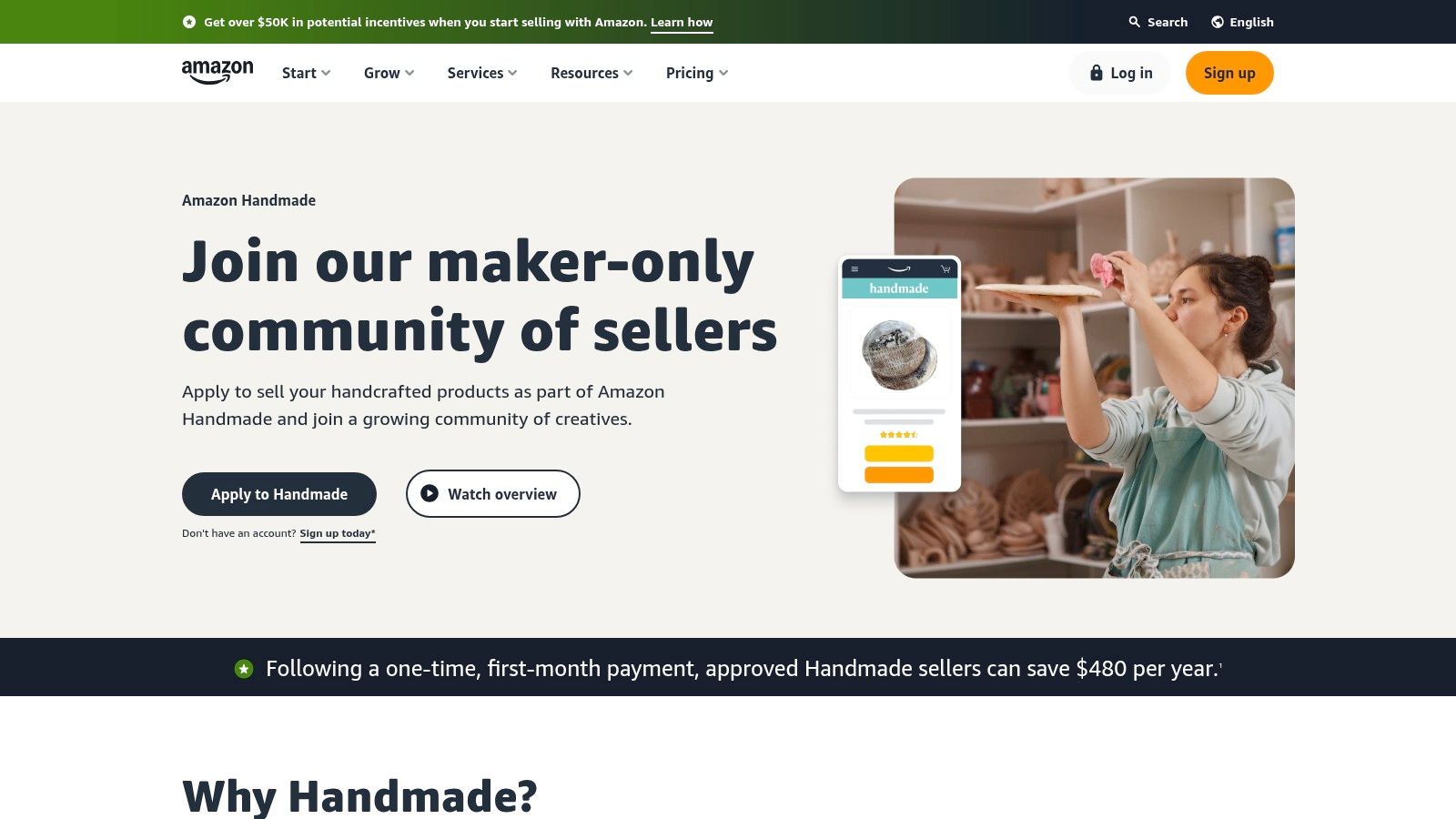
Amazon Handmade earns its place in this Shopify vs Etsy comparison because it offers a unique blend of reach and specialization. Unlike setting up a standard Amazon seller account, Handmade provides a curated space specifically for handcrafted items. This allows artisans to tap into Amazon's 300+ million active customers, a significantly larger audience than Etsy, while still preserving the unique appeal of handmade goods.
One of the most significant advantages of Amazon Handmade is its integration with Amazon Prime. This allows sellers to offer Prime shipping benefits, a huge draw for many online shoppers. Leveraging Prime can dramatically increase visibility and sales, making it a powerful tool in a competitive marketplace. Furthermore, sellers can choose to utilize Fulfillment by Amazon (FBA), which handles storage, shipping, and customer service, streamlining operations, particularly for high-volume sellers. This is particularly attractive compared to Shopify, which requires you to establish your own fulfillment solutions.
While there's no monthly subscription fee for the professional selling plan (it's waived for Handmade sellers), Amazon Handmade does charge a referral fee of 15% on most handmade products. This is considerably higher than Etsy's transaction fees and can impact profit margins. Additionally, Amazon Handmade has strict product qualification requirements to ensure that only genuinely handcrafted items are sold on the platform. This vetting process, while beneficial for maintaining quality, can be a hurdle for some sellers. Finally, branding and personalization options are more limited compared to Shopify, where you have complete control over your online store's design and functionality. The highly competitive marketplace environment on Amazon is also a factor to consider.
For sellers transitioning from Shopify, migrating product listings to Amazon Handmade requires manual entry, as there isn't a direct import tool. Be prepared to invest time in creating detailed product descriptions and high-quality images that adhere to Amazon's guidelines. Consider focusing on niche products where you can differentiate yourself from the competition.
In the Shopify vs Etsy debate, Amazon Handmade emerges as a powerful third option for sellers seeking massive reach and access to Prime benefits. However, the higher referral fees and stricter requirements warrant careful consideration. If you’re comfortable operating within Amazon’s ecosystem and prioritize reaching a large customer base, then Amazon Handmade could be a lucrative platform for your handmade business. You can explore Amazon Handmade and its features further at https://services.amazon.com/handmade.html.
6. Squarespace: A Polished Alternative to Shopify and Etsy
When comparing Shopify vs Etsy, Squarespace often emerges as a compelling alternative, especially for users prioritizing aesthetics and a seamless brand experience. Squarespace shines as a website builder with robust e-commerce capabilities, perfect for businesses where visual presentation is paramount. Think photographers showcasing portfolios, artists selling prints, or small boutiques offering curated collections. Its all-in-one platform combines content management and online selling, streamlining the process of building a beautiful online presence and selling products. This integrated approach distinguishes it from platforms like Etsy, which focuses solely on selling, and offers a different experience from Shopify's more extensive, but sometimes complex, ecosystem.
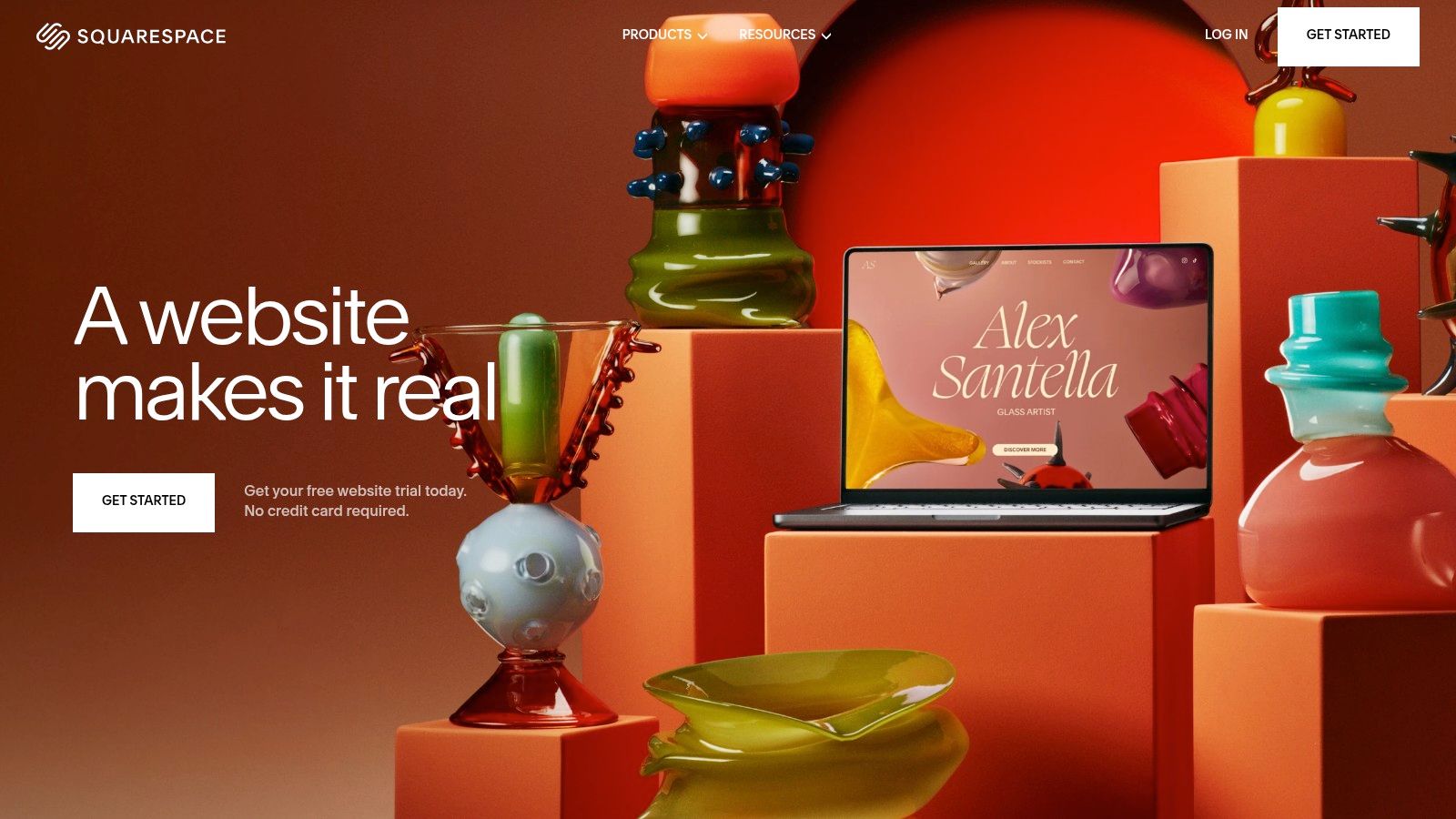
Squarespace's award-winning designer templates are optimized for mobile viewing, ensuring your store looks stunning on any device. Its integrated e-commerce functionality, free of transaction fees on higher-tier plans (starting at $23/month billed annually), simplifies selling. Built-in tools for tax, shipping, and discount management further streamline operations. This can be particularly appealing to users migrating from Etsy, who might be looking for more control over their branding and pricing structure. Compared to Shopify, Squarespace simplifies setup and ongoing maintenance, making it a more accessible choice for users less familiar with e-commerce platforms. However, this ease of use comes with slightly less scalability for large inventories, and fewer third-party app integrations than Shopify offers.
Key Features & Benefits:
- Designer Templates: Choose from a curated selection of visually stunning templates, easily customizable to match your brand.
- Integrated E-commerce: Seamlessly sell products directly on your website without needing separate platforms.
- No Transaction Fees (on higher plans): Maximize profits by avoiding per-sale charges common on some platforms like Etsy.
- Built-in Management Tools: Handle taxes, shipping, and discounts efficiently within the platform.
- Content Management: Create blog posts, portfolio pages, and other content to enhance your online presence, a feature that differentiates it from Etsy’s purely transactional focus.
- SEO & Marketing Tools: Optimize your site for search engines and run email marketing campaigns directly from Squarespace.
Pros:
- Beautiful, professional designs: Create a visually impressive online store with minimal effort.
- All-in-one platform: Manage your website and online store in one place.
- Intuitive visual editor: Easy to use, even for beginners with limited technical skills.
- Excellent customer support: Get assistance when you need it.
Cons:
- Less scalable for large inventories: Might not be the best fit for businesses with a vast product catalog, unlike Shopify which excels in this area.
- Fewer third-party integrations: Limited options compared to Shopify's extensive app ecosystem.
- Limited payment gateway options: Fewer choices compared to both Shopify and Etsy.
- Higher starting cost for e-commerce: The basic plan doesn't include e-commerce functionality.
Implementation Tips:
- Choose the right template: Select a template that aligns with your brand aesthetic and product offerings.
- Customize your template: Personalize your site with your logo, colors, and fonts.
- Organize your products: Categorize and tag your products for easy navigation.
- Utilize SEO tools: Optimize your product descriptions and website content for search engines.
Squarespace (https://www.squarespace.com/) deserves a spot in this Shopify vs Etsy comparison because it offers a distinct approach. It caters to users who prioritize a visually appealing online store and a streamlined, all-in-one experience. While it might not offer the same level of scalability or app integrations as Shopify, its ease of use and beautiful designs make it a strong contender, particularly for small businesses and creatives seeking a polished and professional online presence.
7. Wix
When comparing Shopify vs Etsy, Wix often emerges as a compelling alternative for entrepreneurs seeking an easy-to-use platform with extensive design flexibility. Wix offers a complete website building experience with robust e-commerce functionality, making it a viable option for small to medium-sized businesses looking to establish a strong online presence. Unlike Etsy's marketplace environment, Wix gives you full control over your branding and website design, similar to Shopify, but with a gentler learning curve. This makes it a strong contender if you're just starting out and don't want the technical complexities of Shopify.
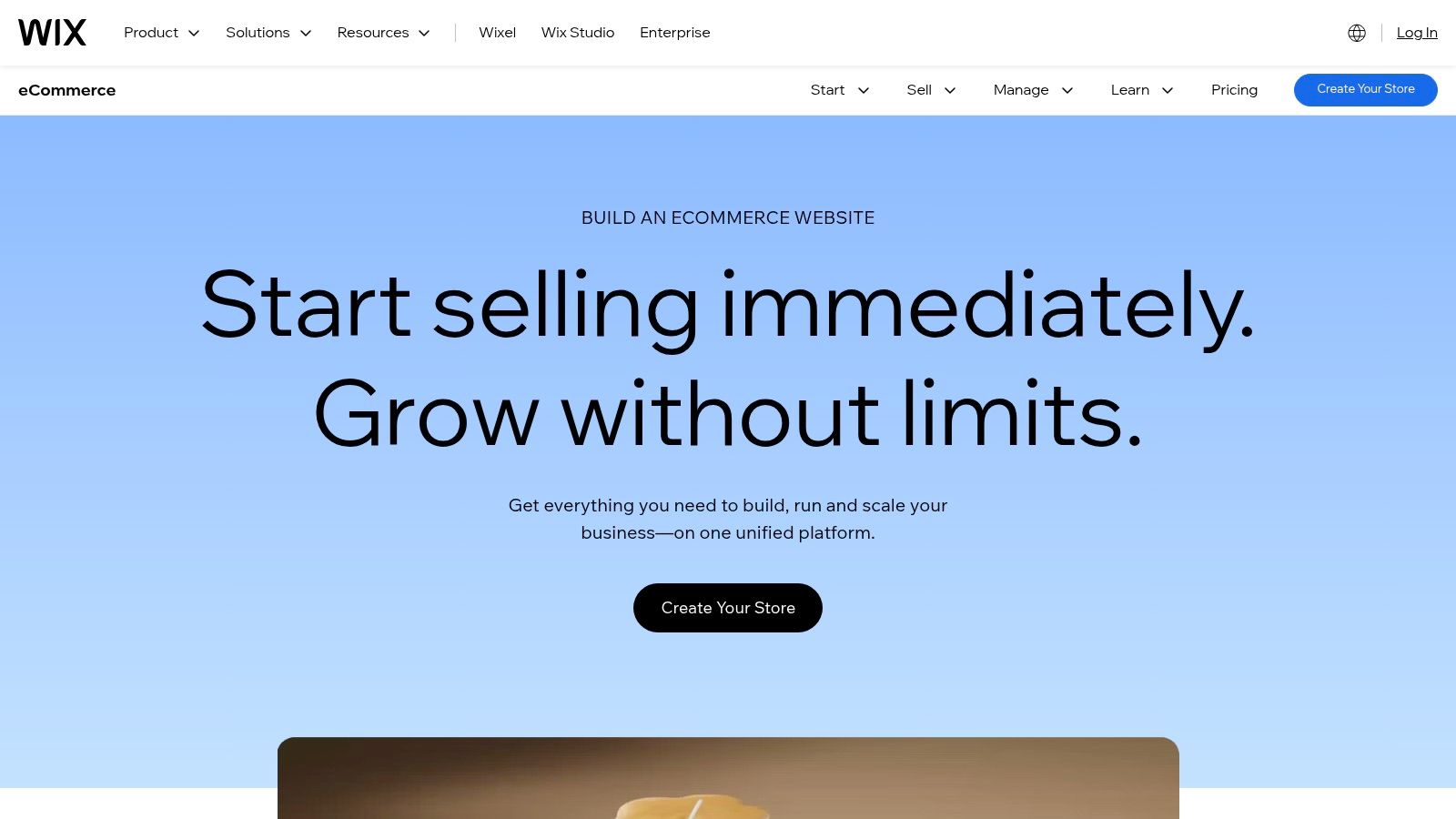
Wix shines with its intuitive drag-and-drop website builder, boasting over 800 designer-made templates. This is a key differentiator in the Shopify vs Etsy debate, as Wix prioritizes design freedom while providing a structured framework. Its Artificial Design Intelligence (ADI) can even automatically create a website based on your answers to a few simple questions, further simplifying the setup process. For those migrating from a platform like Etsy and seeking more control, Wix's ease of use can be a major draw. You can customize your store's appearance without needing to code, unlike Shopify, which often requires some coding knowledge for more advanced customizations.
Wix's e-commerce plans provide all the essential tools you need to run an online store. This includes integrated shopping carts, secure checkout processes, various payment gateways, and multi-channel selling capabilities across platforms like Facebook, Instagram, and Amazon. These features are comparable to Shopify's offerings, giving you the power to manage your entire online business from a centralized platform. Wix also includes built-in marketing tools and SEO features, crucial for driving traffic and competing effectively in the online marketplace. While Shopify often requires third-party apps for some of these features, Wix provides many out-of-the-box, streamlining your workflow.
Pros:
- Extremely User-Friendly Interface: Ideal for beginners and those transitioning from Etsy.
- No Coding Required: Easily customize your online store without technical expertise.
- Versatile Template Designs: Choose from a wide range of templates across various industries.
- Comprehensive App Market: Expand functionality with numerous add-ons.
Cons:
- Limited Scalability: May not be suitable for large, high-volume businesses, unlike Shopify.
- Template Lock-in: Cannot change templates after your site is created. Plan carefully!
- Transaction Fees: Basic business plans may include transaction fees. Carefully compare pricing tiers.
- Performance Issues: Can become slow and cluttered if too many features or apps are activated.
Pricing: Wix offers a range of e-commerce plans with increasing features and capabilities. Check their website for current pricing as these are subject to change.
Technical Requirements: None. Wix is a fully hosted platform, so you don't need to worry about hosting, server management, or technical configurations.
Website: https://www.wix.com/ecommerce/website
Wix deserves its place in the Shopify vs Etsy discussion because it provides a balanced solution. If you're intimidated by Shopify’s complexity but desire more control than Etsy offers, Wix's user-friendly interface and design flexibility make it an excellent option. It empowers you to create a professional and visually appealing online store without the steep learning curve associated with other platforms. However, consider the potential limitations regarding scalability if you anticipate significant growth.
8. Shopify Lite
When comparing Shopify vs Etsy, Shopify Lite often gets overlooked, but it offers a unique solution for specific selling scenarios. It's designed for businesses that aren't ready for a full online store but still want the power of Shopify's backend tools. Think of it as dipping your toes into the Shopify ecosystem without the full commitment (or cost) of a standard Shopify plan. This makes it a compelling option for those wanting more control than Etsy provides, but without the complexity of managing a full-fledged e-commerce website. It bridges the gap perfectly for sellers who already have an established online presence and are looking to integrate sales seamlessly.
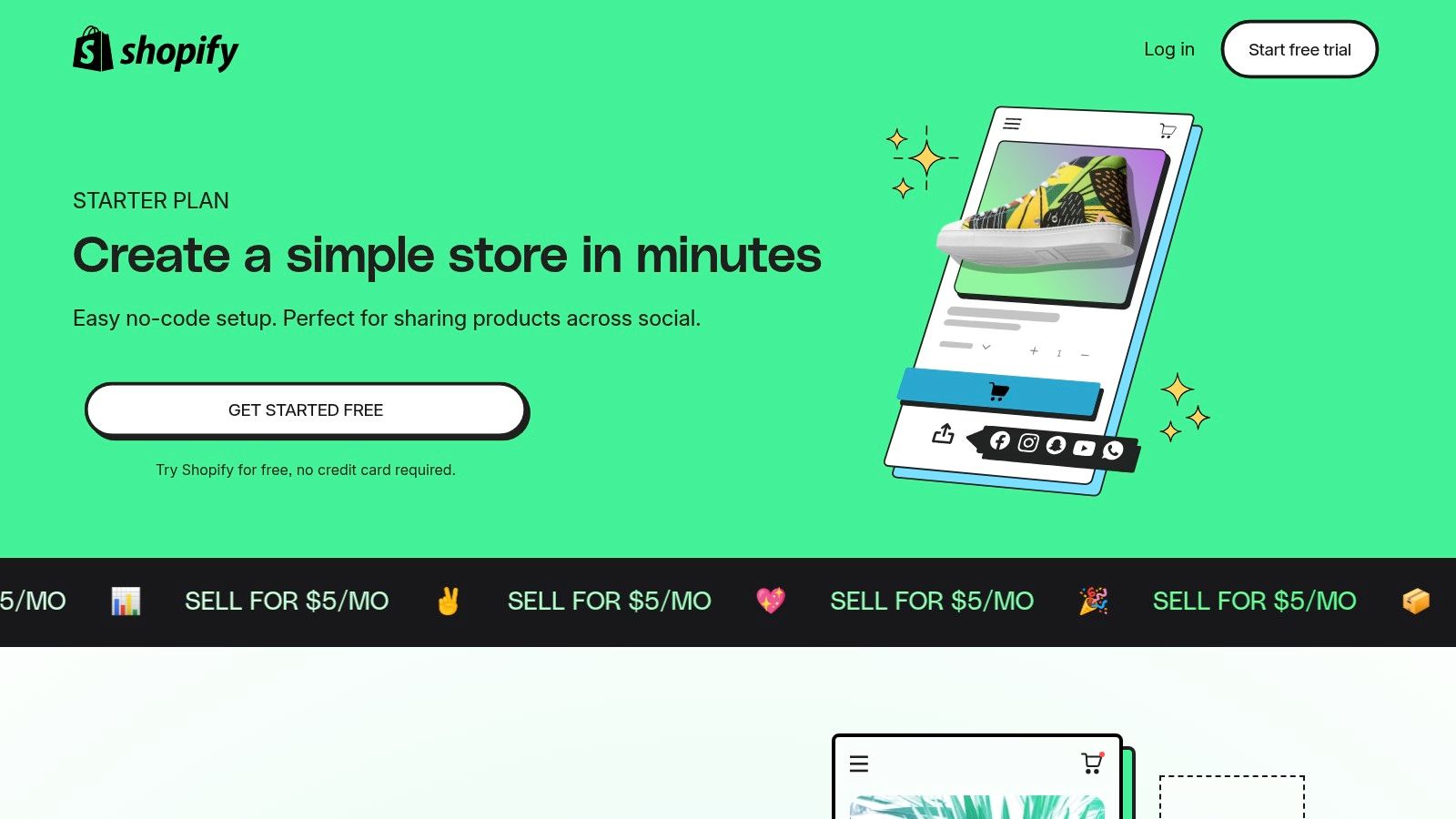
For example, a blogger with a large following might use Shopify Lite to sell merchandise directly through their website using embedded "Buy Buttons." Alternatively, a business with a strong Facebook presence could leverage Shopify Lite's Facebook Shop integration to sell directly on their social media page. This can be a significant advantage in the Shopify vs Etsy debate as it offers a level of sales channel control not found on Etsy. Shopify Lite also excels as a point-of-sale (POS) system for businesses primarily selling offline at markets, pop-up shops, or brick-and-mortar locations. It provides a unified platform to manage inventory and sales across both online and offline channels.
At just $9/month, Shopify Lite is the most affordable Shopify plan. It grants access to Shopify's robust inventory management system, allowing you to track stock levels, manage product variations, and fulfill orders efficiently. You also get access to Shopify's admin interface and analytics, providing valuable insights into sales data and customer behavior. This data can inform your marketing strategies and help you optimize your sales efforts. If your business grows, transitioning to a full Shopify plan is seamless, making Shopify Lite a low-risk entry point.
Features:
- Embeddable Buy Buttons for existing websites or blogs
- Facebook Shop integration for selling directly on social media
- Shopify POS Lite for in-person selling
- Invoice creation and payment collection tools
- Access to Shopify's inventory management system
Pros:
- Most affordable Shopify option at $9/month
- Simple integration with existing websites or blogs
- Full access to Shopify's admin interface and analytics
- Seamless transition path to full Shopify if business grows
Cons:
- No standalone online store or shopping cart functionality
- Limited customization options compared to full Shopify
- Still charges transaction fees for non-Shopify Payments processors
- Lacks abandoned cart recovery and other advanced features
Website: https://www.shopify.com/lite
Implementation Tip: When setting up Shopify Lite, consider your primary sales channels. If you’re focusing on social media, prioritize optimizing your Facebook Shop. For existing websites, strategically place Buy Buttons alongside product descriptions or blog posts. Ensure your branding remains consistent across all platforms for a professional and cohesive customer experience.
Shopify Lite is a valuable tool in the Shopify vs Etsy comparison, especially for businesses prioritizing existing web and social presences or those seeking a primarily POS solution. While it lacks the full functionality of a standard Shopify store, its affordability, streamlined features, and ease of use make it an attractive option for specific selling scenarios.
Shopify vs Etsy and 6 More: 8-Platform Comparison
| Platform | Core Features (✨) | Experience (★) | Value (💰) | Audience (👥) | USP (🏆) |
|---|---|---|---|---|---|
| Shopify | 70+ themes, inventory management, integrated payments, extensive apps | Customizable, scalable, robust support | Subscription from $29/month + fees | All sizes; full control sellers | Complete e-commerce ecosystem |
| Etsy | Ready-made marketplace, built-in SEO, mobile app | Simple setup, low startup costs, brand trust | No monthly fee; high transaction fees | Artisans, creative entrepreneurs | Instant access to 96M buyers |
| BigCommerce | Enterprise-grade, unlimited products, B2B tools, headless commerce | Robust, scalable, advanced SEO | Starting at $29.95/month, no transaction fees | High-volume and B2B sellers | All-in-one built-in features |
| WooCommerce | Open-source plugin, unlimited customization, extensive extensions | Flexible but requires technical management | No platform fee; only hosting costs | WordPress users, developers, flexible shops | Seamless WordPress integration |
| Amazon Handmade | Artisan profiles, Prime integration, FBA options | High traffic, professional seller tools | No monthly fee; 15% referral fee | Artisans, handmade product sellers | Access to Amazon's 300M+ customer base |
| Squarespace | Designer templates, integrated e-commerce, drag-and-drop, built-in tax/shipping tools | Visually stunning, intuitive, professional design | Starts at $23/month (annual billing) | Creatives, photographers, small businesses | Award-winning, high-design templates |
| Wix | Drag-and-drop builder, 800+ templates, ADI, multi-channel capabilities | User-friendly, versatile but can be cluttered | Affordable; basic plan includes transaction fees | Beginners, SMBs | Extensive creative freedom |
| Shopify Lite | Embeddable buy buttons, Facebook shop, POS Lite, inventory management | Simple integration with existing websites | Only $9/month with upgrade path | Social sellers, bloggers, small retailers | Affordable e-commerce added to any site |
Making the Final Decision
Choosing the right eCommerce platform can feel overwhelming, especially with so many options available. This article explored several key players, including Shopify, Etsy, BigCommerce, WooCommerce, Amazon Handmade, Squarespace, Wix, and even Shopify Lite. Each platform offers a unique set of features and caters to different business needs. The Shopify vs Etsy debate often boils down to control and audience. Shopify provides greater control over branding and storefront customization, while Etsy offers a built-in marketplace with a large audience of handmade and vintage product seekers.
Key takeaways to remember when making your decision: consider your budget, technical skills, desired level of control, and target audience. If you're looking for a platform that allows for extensive customization and scalability, Shopify might be the better choice. If you're just starting out and prefer a simpler setup with a ready-made audience, Etsy might be a good starting point. Don't forget to factor in transaction fees, listing fees, and other costs associated with each platform.
Implementing your chosen tool effectively is crucial for success. Regardless of whether you choose Shopify, Etsy, or another platform, take the time to optimize your product listings, create compelling product photography, and develop a strong marketing strategy.
Ultimately, the right eCommerce platform is the one that best aligns with your specific business goals and resources. Take your time, do your research, and choose wisely!
For Shopify merchants looking to streamline their marketing and connect with customers on various social media platforms, LinkShop provides a powerful link-in-bio solution. Create a shoppable landing page that complements your Shopify store and drives traffic directly to your products. Elevate your Shopify presence with LinkShop today! LinkShop
